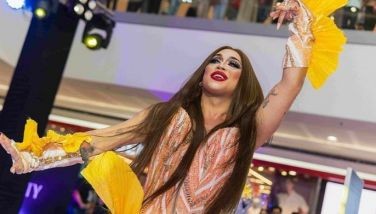Magsaysay: An earnest look at a legend
September 10, 2006 | 12:00am
When Eugenia Duran Apostol received the Magsaysay Award for Journalism last week, she made public for the first time what many in my generation believed – that the plane crash in March 1957 which killed President Ramon Magsaysay was no accident. The plane was bombed.
Nestor Mata, the journalist, now columnist of Malaya, was the only survivor. But as he said, he was asleep and when he regained consciousness, he was on the ground, severely burned.
When Magsaysay campaigned for the presidency in 1955, he was mobbed by everyone. When he died, people in the streets wept.
The presidential plane, a C-47, was an old reliable in World War II craft – so sturdy it continued to be used during the Vietnam War, into the ’70s. The pilot of the plane, Colonel Ebuen, was one of the Air Force’s best. An accident was unlikely.
Who could have planted the bomb? To those of us who knew Magsaysay, there was only one credible suspect – the oligarchy which was fearful that Magsaysay would seize power and destroy them. Twenty years later, Ferdinand Marcos did just that. Like Magsaysay, he was Ilokano but the wrong Ilokano and, worse, the wrong leader as well.
Was Magsaysay planning on a long tenure to change the country’s political structure? For sure, he would have easily won a second term; for sure, too, he was fed up with an entrenched oligarchy that obstructed his pro-masa program.
This was never explicit, for who could know what Magsaysay’s political plans were? One thing is sure – he had the support of the US government, which was willing to fund the sweeping land reform program that he wanted – a program which he could not push through a Congress then dominated by landlords.
How to explain Magsaysay’s bonding with the masa?
Magsaysay’s guerrilla days during the Japanese Occupation exposed him to the harsh realities of peasant life; he had personal relationships with the peasantry who supported the guerrillas. It was with this experience that he also felt kinship with the Huks who were, during the Japanese Occupation, the largest and best organized of all the guerrillas fighting the Japanese but were demonized by the government and the Americans at the end of the war when the Cold War between a communist Russia and the United States started.
Ninoy Aquino, a Magsaysay follower, was responsible for bringing Luis Taruc, the Huk leader, to the government fold.
Taruc would not have been imprisoned if Magsaysay had his way but he was dependent on American assistance and couldn’t resist the pressure from them. He knew well enough that a country, battered by World War II, cannot recover from that damage without American assistance. He also had the promise of the Americans that they would help him push through agrarian reform.
His sympathy for the masses, for the Huks, was genuine. As he said, "Ricricnaec ti ricricnaen da." (I feel what they feel.)
At the time, he already knew the basic economic difficulties of the country, the monopolies that were protected by government, the evils of landlordism. The elites had a real but unspoken fear of him. Claro M. Recto opposed agrarian reform not because of principle, but because, in his own words, "Yung mangmang na iyan, ninakaw niya ang pagka presidente sa akin (That ignoramus stole the presidency from me)." And Lorenzo Tañada opposed agrarian reform because he was himself a wealthy landlord.
These two nationalist icons had a strong influence on the direction of foreign policy.
Magsaysay despised them not so much because they opposed him but because their nationalism had no relevance to the masa.
The late Manny Manahan, one of Magsaysay’s trusted men, vouched for Magsaysay’s granite integrity. It was incredible that it was "elitists" such as Manahan, Emmanuel Pelaez, Jose W. Diokno and Raul Manglapus who supported Magsaysay’s land reform agenda.
As Manny Manahan recounts, Magsaysay had asked him to go to Castillejos to attend his birthday party. Magsaysay gathered his whole clan, including his aged father. And in their presence, Magsaysay told Manahan, "These are my relatives. Look at them, recognize them all. And if there is ever any one of them who commits dishonesty, jail him…"
Manny Manahan, recounting that incident, said he was never so embarrassed in his life.
Magsaysay was no angel; he had his faults. He was impatient, impetuous, but he was quick to rectify mistakes before they did more harm. I fault him for having pampered media, bestowing privileges, lucrative jobs in government to journalists. No President did this. But no President got the same mileage, either; he deserved those hosannas for the transparency and the fresh air he brought to stuffy offices like Malacañang which, in his time, was open to the public unlike the forbidding fortress that it became under Marcos – and on to this day.
Magsaysay died poor. He did not take advantage of the tremendous power of the presidency as so many of our leaders had done. His family had no house to go to when they left Malacañang. The real estate owner, Francisco Ortigas, donated a lot for Magsaysay in Mandaluyong. Each of the stevedores in the piers donated a tile for the roof of the house.
Fortunately for the Magsaysay children, they were enterprising and were able to provide for themselves.
There are still Filipinos – in their eighties and seventies – who knew Magsaysay personally, who heard him articulate his vision. Among them is the publisher of this newspaper, Max Soliven. Nestor Mata, the only survivor of that plane crash on Mt. Manunggal, retired Army officers, and one of his closest friends, Frisco San Juan.
They would tell, for instance, the officials of the Ramon Magsaysay Foundation – the agency tasked to commemorate his name – that Magsaysay would turn in his grave if he found out that members of the oligarchy were among its board of trustees.
Magsaysay left several important legacies. After him, it was no longer possible for any candidate to run for the presidency without going to the people. Until Magsaysay came, politicians just appealed to their leaders in the provinces to campaign for them.
He left an Armed Forces that was disciplined, aware of its duties, but Marcos destroyed this legacy when he politicized and Ilokanized the Armed Forces – something which Magsaysay, an Ilokano, never did.
He recognized the rural areas as the core of a progressive and democratic Philippines. He emphasized community development and land reform. He opened up areas in Mindanao and Luzon. In the Fifties, there were still available lands for resettlement.
Conrado Estrella, a longtime ally of Magsaysay since he was a small-town mayor, served under several presidents. When asked by the foreign correspondent Robert Shaplen whom he thought was the best president ever, because he was Marcos’ longest serving agrarian reform secretary, I was wondering if he would give Marcos that honor.
"Magsaysay," he said without a second thought.
The author received the Magsaysay Award in 1980.
Nestor Mata, the journalist, now columnist of Malaya, was the only survivor. But as he said, he was asleep and when he regained consciousness, he was on the ground, severely burned.
When Magsaysay campaigned for the presidency in 1955, he was mobbed by everyone. When he died, people in the streets wept.
The presidential plane, a C-47, was an old reliable in World War II craft – so sturdy it continued to be used during the Vietnam War, into the ’70s. The pilot of the plane, Colonel Ebuen, was one of the Air Force’s best. An accident was unlikely.
Who could have planted the bomb? To those of us who knew Magsaysay, there was only one credible suspect – the oligarchy which was fearful that Magsaysay would seize power and destroy them. Twenty years later, Ferdinand Marcos did just that. Like Magsaysay, he was Ilokano but the wrong Ilokano and, worse, the wrong leader as well.
Was Magsaysay planning on a long tenure to change the country’s political structure? For sure, he would have easily won a second term; for sure, too, he was fed up with an entrenched oligarchy that obstructed his pro-masa program.
This was never explicit, for who could know what Magsaysay’s political plans were? One thing is sure – he had the support of the US government, which was willing to fund the sweeping land reform program that he wanted – a program which he could not push through a Congress then dominated by landlords.
How to explain Magsaysay’s bonding with the masa?
Magsaysay’s guerrilla days during the Japanese Occupation exposed him to the harsh realities of peasant life; he had personal relationships with the peasantry who supported the guerrillas. It was with this experience that he also felt kinship with the Huks who were, during the Japanese Occupation, the largest and best organized of all the guerrillas fighting the Japanese but were demonized by the government and the Americans at the end of the war when the Cold War between a communist Russia and the United States started.
Ninoy Aquino, a Magsaysay follower, was responsible for bringing Luis Taruc, the Huk leader, to the government fold.
Taruc would not have been imprisoned if Magsaysay had his way but he was dependent on American assistance and couldn’t resist the pressure from them. He knew well enough that a country, battered by World War II, cannot recover from that damage without American assistance. He also had the promise of the Americans that they would help him push through agrarian reform.
His sympathy for the masses, for the Huks, was genuine. As he said, "Ricricnaec ti ricricnaen da." (I feel what they feel.)
At the time, he already knew the basic economic difficulties of the country, the monopolies that were protected by government, the evils of landlordism. The elites had a real but unspoken fear of him. Claro M. Recto opposed agrarian reform not because of principle, but because, in his own words, "Yung mangmang na iyan, ninakaw niya ang pagka presidente sa akin (That ignoramus stole the presidency from me)." And Lorenzo Tañada opposed agrarian reform because he was himself a wealthy landlord.
These two nationalist icons had a strong influence on the direction of foreign policy.
Magsaysay despised them not so much because they opposed him but because their nationalism had no relevance to the masa.
The late Manny Manahan, one of Magsaysay’s trusted men, vouched for Magsaysay’s granite integrity. It was incredible that it was "elitists" such as Manahan, Emmanuel Pelaez, Jose W. Diokno and Raul Manglapus who supported Magsaysay’s land reform agenda.
As Manny Manahan recounts, Magsaysay had asked him to go to Castillejos to attend his birthday party. Magsaysay gathered his whole clan, including his aged father. And in their presence, Magsaysay told Manahan, "These are my relatives. Look at them, recognize them all. And if there is ever any one of them who commits dishonesty, jail him…"
Manny Manahan, recounting that incident, said he was never so embarrassed in his life.
Magsaysay was no angel; he had his faults. He was impatient, impetuous, but he was quick to rectify mistakes before they did more harm. I fault him for having pampered media, bestowing privileges, lucrative jobs in government to journalists. No President did this. But no President got the same mileage, either; he deserved those hosannas for the transparency and the fresh air he brought to stuffy offices like Malacañang which, in his time, was open to the public unlike the forbidding fortress that it became under Marcos – and on to this day.
Magsaysay died poor. He did not take advantage of the tremendous power of the presidency as so many of our leaders had done. His family had no house to go to when they left Malacañang. The real estate owner, Francisco Ortigas, donated a lot for Magsaysay in Mandaluyong. Each of the stevedores in the piers donated a tile for the roof of the house.
Fortunately for the Magsaysay children, they were enterprising and were able to provide for themselves.
There are still Filipinos – in their eighties and seventies – who knew Magsaysay personally, who heard him articulate his vision. Among them is the publisher of this newspaper, Max Soliven. Nestor Mata, the only survivor of that plane crash on Mt. Manunggal, retired Army officers, and one of his closest friends, Frisco San Juan.
They would tell, for instance, the officials of the Ramon Magsaysay Foundation – the agency tasked to commemorate his name – that Magsaysay would turn in his grave if he found out that members of the oligarchy were among its board of trustees.
Magsaysay left several important legacies. After him, it was no longer possible for any candidate to run for the presidency without going to the people. Until Magsaysay came, politicians just appealed to their leaders in the provinces to campaign for them.
He left an Armed Forces that was disciplined, aware of its duties, but Marcos destroyed this legacy when he politicized and Ilokanized the Armed Forces – something which Magsaysay, an Ilokano, never did.
He recognized the rural areas as the core of a progressive and democratic Philippines. He emphasized community development and land reform. He opened up areas in Mindanao and Luzon. In the Fifties, there were still available lands for resettlement.
Conrado Estrella, a longtime ally of Magsaysay since he was a small-town mayor, served under several presidents. When asked by the foreign correspondent Robert Shaplen whom he thought was the best president ever, because he was Marcos’ longest serving agrarian reform secretary, I was wondering if he would give Marcos that honor.
"Magsaysay," he said without a second thought.
BrandSpace Articles
<
>















